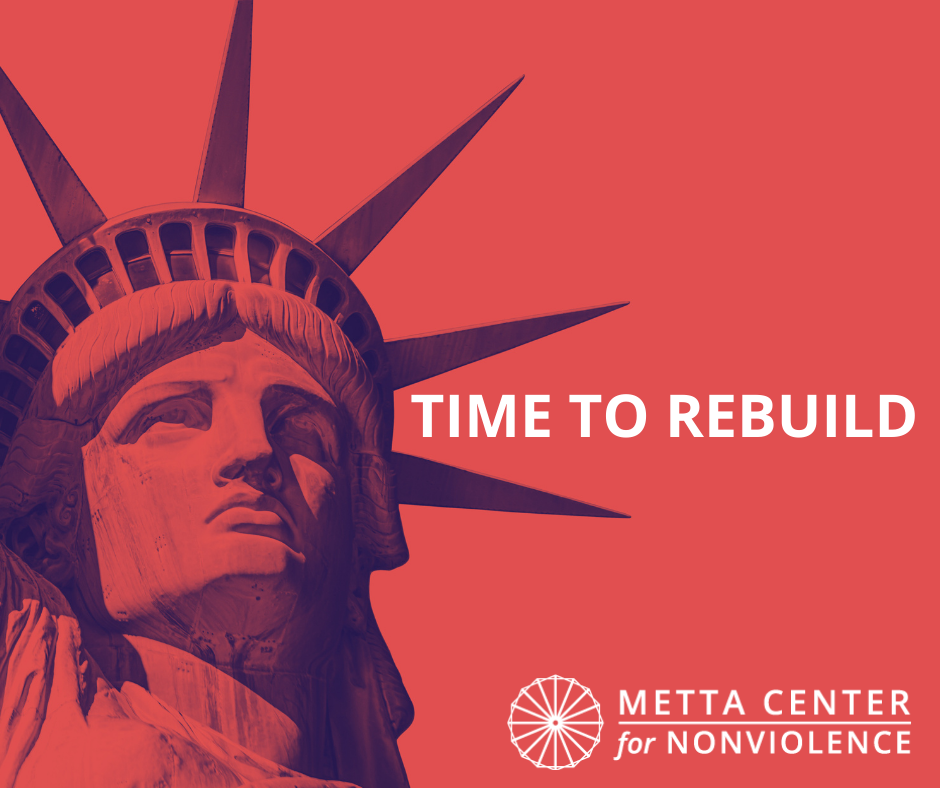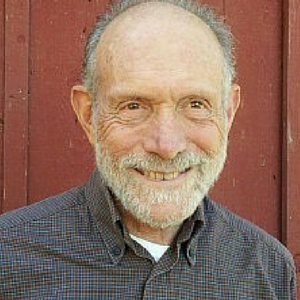
We, the board and staff of the Metta Center, have been in the process of writing something for our friends and followers about the electoral crisis, but the situation has been and remains so fluid that we waited for a definitive outcome at least of the election itself, though there are still dangers and unknowns ahead of us.
One thing is already certain: the last four years have deepened the already painful divisions between people of different races and persuasions. We must do everything we can to heal those divisions, not only for its own sake (differences are normal, divisions painful and can be healed), but to restore faith in democracy worldwide.
Democracy is based on a positive image of the human being, so to restore it in this highly influential country would mean not only to restore faith in democracy but restore our faith in the human image, throughout the world. It would also remove from our path a distraction that has kept us from attending to the biggest problem that has ever faced the human race: how to reverse the destruction of the planet’s integrity that is threatening to make our only home uninhabitable to life.
In the recent election, 99% of the Congresspeople who supported the Green New Deal won reelection. According to a Yale University poll, 82% of voters agreed that America’s main energy goal should be to reach 100% green energy. The stage is set.
In Common Predicament by Sharif and Sharif shows that working on a common problem is the most effective way to heal divisions. These two problems, then, the division and the climate menace — and add in the pandemic for good measure — need not be competing priorities. The first step in realizing this potential is somehow, slowly but steadily, to convince people that both the pandemic and the related issue of climate are human issues, not ideological issues, that we likely can only solve together, by cooperating.
The outcome of the Presidential race is favorable to the cause of nonviolence; but nonviolence can do much more: it can go on to assuage the feelings of those who are smarting from what they perceive as a loss. And this we must do. In Stride Toward Freedom, Martin Luther King relates how the Montgomery bus boycott had almost won the day when a white citizen warned at a council meeting that if they gave in “the Negroes [sic] would say that they had won,” and that was intolerable. In fact, both Gandhi and King warned their movements that they could certainly take pride in and learn lessons from their successes, but they must never yield to triumphalism. We are now in exactly that position, and if we heed that warning we can avoid the backlash that often reverses the successes a nonviolent movement gains.
As we put it at Metta, “When you succeed do not try to work in a new issue, or yield to the temptation to triumph over your former opponents. Remember, the goal is not to ‘win’ but rebuild relationships.”
We learn once again, doing this, that there is no trade-off between ethics and strategy, between the right thing to do and the most effective. In nonviolence, they’re the same.
How can we begin that kind of change in this atmosphere of incivility where polarization has gone so far as to make people vote for death rather than face facts, just because the other side espouses them? One principle we can bear in mind here is Gandhian svadeshi, roughly ‘localism,’ which became the key to Gandhi’s economics and beyond that the whole philosophy of social change and human relationships.
Which of us does not know someone, be it a relative or coworker or friend, on the ‘other’ side? Using whatever relationship we can as a basis, we can follow the successful formula of the very effective peacebuilding organization, The Search for Common Ground: “Find the commonalities, work on the differences.” Armed with this, it becomes easier to reach out and at least hear with respect what they have to say. Respect benefits all and is a powerful force for transformation.
Arnold Toynbee, the great British historian, explains beautifully how it feels like on the receiving end of that kind of respect: “He (Gandhi) made it impossible to go on ruling India; but he made it possible to leave without rancour and without humiliation.”
What we’ve been suggesting is small scale, but small changes can become nodes that interconnect and become the network of a new reality.
Mother Teresa said it beautifully: “We feel that what we are doing is just a drop in the ocean. But if the drop was not in the ocean, I think the ocean would be less because of that missing drop. I do not agree with the big way of doing things. To us what matters is an individual. To get to love the person we must come in close contact with him. If we wait ‘til we get the numbers, then we will be lost in the numbers. And we will never be able to show that love and respect for the person.”
After all, why are we so passionate about democracy? Because, fundamentally, it elevates the dignity of the human being. So does real nonviolence. The consistency of method and goal is powerful.









Soo good. Thank you.